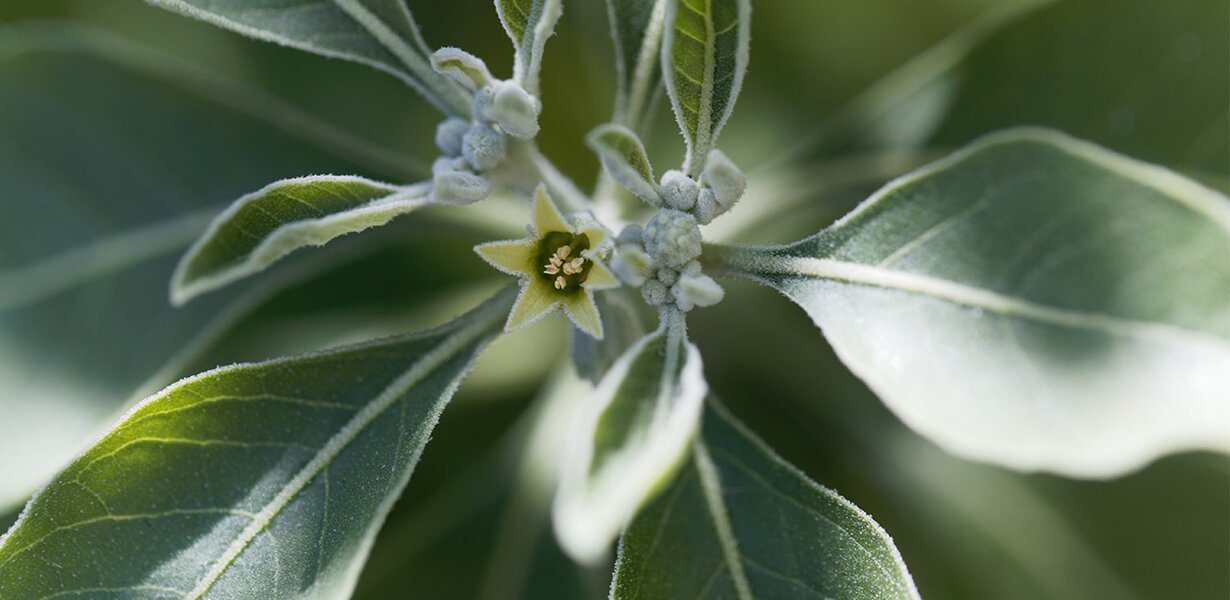Ashwagandha (Withania somnifera), also known as the "Queen of Ayurveda" and sleeping berry, is a traditional plant that helps you fall asleep, supports you during stress and increases your resistance to stressors. More and more people are discovering this powerful root, which has been valued for its balancing effect for thousands of years. Immerse yourself in the fascinating history of this special plant and find out why ashwagandha is more relevant today than ever before.
What is ashwagandha?
Ashwagandha (Withania somnifera), also known as Indian ginseng, winter cherry or sleep berry, is a ‘child with many names’. Originally from Africa and Asia, the ‘queen of Ayurveda’ spread from these regions to other countries and can now also be found in southern Europe, on the Canary Islands and Cape Verde. The plant loves sandy to gravelly soils and, given good conditions, can grow to a height of 160 cm. Externally, the herbaceous nightshade plant is characterised by ovate to elongated leaves that are mint-green to olive-green in colour. The undersides of the leaves are covered with fine hairs. During its flowering period between July and September, the plant produces relatively inconspicuous bell-shaped flowers, which develop into strikingly bright red berry fruits.
What is ashwagandha good for? - Effect & scientifically documented uses
Anyone who associates the word ashwagandha and the epithet ‘queen of Ayurveda’ with fairytale images from Indian genres will be somewhat surprised by the original meaning. In ancient Indian Sanskrit, ashwagandha means ‘the smell of a horse’ – a name that the plant probably owes to its characteristic scent. Some Ayurvedic experts also see this as an indication that the plant ‘can awaken the stallion in us’. But that is not the only health benefit that ashwagandha has to offer.
Ashwagandha as protection against restlessness and stress
In Ayurveda, ashwagandha has been used for thousands of years to support vitality and well-being, strengthen vitality and maintain mental health. As a plant-based adaptogen, it promotes our ability to adapt, strengthens our resistance to stress and helps those suffering from stress to find inner peace. Human studies have now also confirmed that ashwagandha delivers what it promises.
Ashwagandha as a sleep-inducing berry – because nomen est omen
Sleep disorders are a widespread phenomenon in our modern times. But, as is so often the case in life, there are traditional answers to modern questions. The German name ‘Schlafbeere’ (sleep berry) and the Latin species name ‘somnifera’ (sleep-inducing) suggest that ashwagandha helps you to sleep. The plant's calming effect is probably due to its influence on the GABA system.
Research Highlights: Did you know that ashwagandha can reduce stress-related insomnia by 70%?
This was the conclusion of a clinical study in which chronically stressed subjects took 300 mg of ashwagandha extract twice a day for eight weeks. Ashwagandha's relaxing and calming effect makes it an ideal ‘sandman’ – especially for people who are kept awake by stress.
Ashwagandha to boost your immune defences
Times have changed and a strong immune system is more in the spotlight. Ashwagandha supports our body's own defences; this was the conclusion of a recent randomised, placebo-controlled, double-blind study in which 30 days' supplementation with 60 mg ashwagandha extract improved the immune profile of healthy adults.
Further traditional uses of the natural talent, according to initial scientific evidence:
- Support for testosterone synthesis and male fertility
- Nutritional contribution to brain performance, attention, and short- and long-term memory
- Neuroprotection
- Support for muscle strength, regeneration and endurance
- Contribution to healthy blood sugar levels
- Support for people who are overweight (especially those who are overweight due to stress)


Ashwagandha for women – a natural all-rounder for female health?
The Withania somnifera plant promises not only support for hormone fluctuations and during menopause, but is also said to boost libido. Read on to find out what women should bear in mind when taking it and what other amazing effects the Ayurvedic root can have.

Ashwagandha and body weight: myth or reality?
Does ashwagandha really cause unwanted weight gain, or is it just a stubborn rumour? The following article explains how this popular adaptogen affects the metabolism and why it can even have the opposite effect on many people. An insightful look at how ashwagandha can contribute to general well-being by reducing stress, improving metabolic balance and supporting healthy muscle growth.

Which substances does ashwagandha contain?
Although ashwagandha is known as winter cherry or sleepberry, it is not the fruit that is used for health purposes. These fruits look tempting and are reminiscent of physalis, but they are inedible due to their high alkaloid content.
Instead, Ashwagandha devotees in the West focus on the root of the plant, which grows underground. This thick, whitish to brownish root contains an interesting blend of phytochemicals.
Ayurveda uses the whole plant in order to utilise the full spectrum of active ingredients. The valuable withanolides, which are responsible for the adaptogenic properties of ashwagandha, are found throughout the plant.
Modern science is particularly interested in the natural withanolides withanolide A, withaferin A and withanolide D. In addition, the plant provides further secondary ingredients such as saponins, tannins and flavonoids, as well as plenty of iron.
What are withanolides?
Withanolides are a group of naturally occurring plant compounds. They are thought to be responsible for the adaptogenic properties of ashwagandha. Adaptogens are phytonutrients that help the body adapt to physical and emotional stress.
What are the withanolide levels in ashwagandha?
The ashwagandha plant contains not only a single biologically active withanolide, but about 40 different representatives, which have been identified in the plant so far. Among the various withanolides, withanolide A, withaferin A, withanone and withanolide D are the most abundant withanolides.

Ashwagandha dosage and how to take it: what should you bear in mind?
Pregnant women and breastfeeding mothers should consult their doctor before taking ashwagandha root. People taking thyroid medication or tranquillisers should also consult their doctor before taking it.
When is it best to take ashwagandha?
In order for ashwagandha to have the desired effect, the right timing is important. To enjoy the stress-relieving effect of the sleep berry, ashwagandha should ideally be taken before a meal. If you find it difficult to fall asleep at night and want to use ashwagandha as a kind of ‘sleep aid’, you should consume the sleep berry before going to bed.
How long should ashwagandha be taken for?
All good things take time. Like many natural substances, ashwagandha takes a few days to a few weeks to have a noticeable effect.
How much ashwagandha is recommended per day?
When it comes to dosage, it is best to follow the recommendation of trusted manufacturers or an expert. The recommended amounts are usually between 400 mg and 600 mg of ashwagandha daily.
How quickly does ashwagandha work?
The effect of ashwagandha unfolds individually and in different phases: While some people feel a relaxing effect after the first dose, the full health benefits usually only become apparent after regular use over several weeks to months. The duration of the effect depends on factors such as dosage and individual physical condition. Many people notice the first positive effects, such as improved sleep, reduced stress or increased concentration, after about 4-8 weeks of regular use. For optimal results, it is recommended to take it consistently at the same time of day, with the effects usually lasting from several hours to a full day.
Where can I get ashwagandha?
If you are looking for premium-quality ashwagandha, BIOGENA is the right choice. BIOGENA Ashwagandha Fusion Complete not only contains high-quality Withania somnifera extract from the root, but also the extract from the entire plant, thus achieving a high withanolide content of 35 mg in total. This makes it easy to gain a little breathing space and rediscover your inner balance through nutrition.
BIOGENA Ashwagandha Triple Superior Gold goes one step further – the luxury formula for relaxed breathing in stressful times. In this innovative triple blend, the two quality features of a high withanolide concentration and a whole plant extract have been maximised by combining three premium ingredients: the patented branded raw material KSM-66®, a withanolide-rich root extract and a genuine whole plant extract. This smart fusion achieves the highest dosage on the market with 40 mg withanolides per capsule. In addition, the whole-plant extract provides the full spectrum of active ingredients from the entire plant. According to the latest research, the properties of the ashwagandha plant known from Ayurveda are based on the synergistic interaction of the different withanolides, which are found not only in the root but throughout the entire plant.
Questions fréquemment posées
The recommended daily dose of ashwagandha varies from person to person and according to the purpose. In general, 400-600 mg per day is considered a safe and effective dose, which is also used in studies. To find the right dosage for your individual needs, it may be helpful to consult a doctor.
Data on a maximum dosage are not yet available. According to studies, successes can already be seen with 240 mg to 600 mg.
Salve J et al. Adaptogenic and Anxiolytic Effects of Ashwagandha Root Extract in Healthy Adults: A Double-blind, Randomized, Placebo-controlled Clinical Study. Cureus. 2019 Dec 25;11(12):e6466. doi: 10.7759/cureus.6466.
Langade D et al. 2021. Clinical evaluation of the pharmacological impact of ashwagandha root extract on sleep in healthy volunteers and insomnia patients: A double-blind, randomized, parallel-group, placebo-controlled study. Randomized Controlled Trial. J Ethnopharmacol. 2021 Jan 10;264:113276. doi: 10.1016/j.jep.2020.113276. Epub 2020 Aug 17.
Deshpande A et al. 2020. A randomized, double blind, placebo controlled study to evaluate the effects of ashwagandha (Withania somnifera) extract on sleep quality in healthy adults. Randomized Controlled Trial. Sleep Med. 2020 Aug;72:28-36. doi: 10.1016/j.sleep.2020.03.012. Epub 2020 Mar 21.
Chandrasekhar, K. et al. 2012. A prospective, randomized double-blind, placebo-controlled study of safety and efficacy of a high-concentration full-spectrum extract of ashwagandha root in reducing stress and anxiety in adult. INDIAN J PSYCHOL MED. 34(3):255–62. https://pubmed.ncbi.nlm.nih.gov/23439798/
Kuboyama, T. et al. 2014. Effects of Ashwagandha (roots of Withania somnifera) on neurodegenerative diseases. Biol Pharm Bull. 37(6):892–7. https://www.jstage.jst.go.jp/article/bpb/37/6/37_b14-00022/_article
Pratte, M. A. et al. 2014. An Alternative Treatment for Anxiety: A Systematic Review of Human Trial Results Reported for the Ayurvedic Herb Ashwagandha (Withania somnifera). J Altern Complement Med. 20(12):901–8. https://pubmed.ncbi.nlm.nih.gov/25405876/
Chandran, U., Patwardhan, B. K. 2016. Network ethnopharmacological evaluation of the immunomodulatory activity of Withania somnifera. J Ethnopharmacol. 72(23):4445–60. https://linkinghub.elsevier.com/retrieve/pii/S0378874116305098
Tharakan A. et al. 2021. Immunomodulatory Effect of Withania somnifera (Ashwagandha) Extract-A Randomized, Double-Blind, Placebo Controlled Trial with an Open Label Extension on Healthy Participants. J Clin Med. 2021 Aug 18;10(16):3644. doi: 10.3390/jcm10163644.
Sengupta P et al. 2018. Role of Withania somnifera (Ashwagandha) in the management of male infertility Review. Reprod Biomed Online. 2018 Mar;36(3):311-326. doi: 10.1016/j.rbmo.2017.11.007. Epub 2017 Dec 7.
Sharma, A et al. 2018. Efficacy and Safety of Ashwagandha Root Extract in Subclinical Hypothyroid Patients: A Double-Blind, Randomized Placebo-Controlled Trial. Randomized Controlled Trial. J Altern Complement Med. 2018 Mar;24(3):243-248. doi: 10.1089/acm.2017.0183. Epub 2017 Aug 22.
Choudhary D et al. 2017. Efficacy and Safety of Ashwagandha (Withania somnifera (L.) Dunal) Root Extract in Improving Memory and Cognitive Functions. Randomized Controlled Trial. J Diet Suppl. 2017 Nov 2;14(6):599-612. doi: 10.1080/19390211.2017.1284970. Epub 2017 Feb 21.
Ng Q.X. et al. 2020. A systematic review of the clinical use of Withania somnifera (Ashwagandha) to ameliorate cognitive dysfunction. Phytother Res. 2020 Mar;34(3):583-590. doi: 10.1002/ptr.6552. Epub 2019 Nov 19.
Zahiruddin S et al. Ashwagandha in brain disorders: A review of recent developments. J Ethnopharmacol. 2020 Jul 15;257:112876. doi: 10.1016/j.jep.2020.112876. Epub 2020 Apr 16.
Bonilla D.A. et al. 2021. Effects of Ashwagandha ( Withania somnifera) on Physical Performance: Systematic Review and Bayesian Meta-Analysis. J Funct Morphol Kinesiol. 2021 Feb 11;6(1):20. doi: 10.3390/jfmk6010020.
Tiwari S et al. 2021. A double-blind, randomized, placebo-controlled trial on the effect of Ashwagandha (Withania somnifera dunal.) root extract in improving cardiorespiratory endurance and recovery in healthy athletic adults. J Ethnopharmacol. 2021 May 23;272:113929. doi: 10.1016/j.jep.2021.113929. Epub 2021 Feb 15.
Choudhary D et al. 2017. Body Weight Management in Adults Under Chronic Stress Through Treatment With Ashwagandha Root Extract: A Double-Blind, Randomized, Placebo-Controlled Trial. J Evid Based Complementary Altern Med. 2017 Jan;22(1):96-106. doi: 10.1177/2156587216641830. Epub 2016 Apr 6.
Chukwuma C.I. 2019. Medicinal plants with concomitant anti-diabetic and anti-hypertensive effects as potential sources of dual acting therapies against diabetes and hypertension: A review. J Ethnopharmacol. 2019 May 10;235:329-360. doi: 10.1016/j.jep.2019.02.024. Epub 2019 Feb 12.
Biogena Mikronährstoffcoach: https://www.mikronaehrstoffcoach.com/de/at/mikronaehrstoffe/micronutrient.ashwagandha.html, Zugriff: 6.10.2021.








